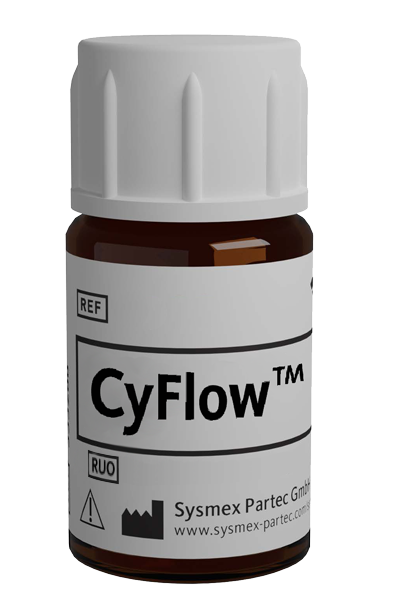CyFlow™ CD28 FITC

| Alternative Name: | Tp44 |
| Antibody: | Yes |
| Antigen: | CD28 |
| Application: | Flow cytometry |
| Clonality: | monoclonal |
| Clone: | JJ319 |
| Emission Maximum: | 518 nm |
| Excitation Maximum: | 490 to 495 nm |
| Field of Interest: | Immunophenotyping, MHC |
| Format/Fluorochrome: | FITC |
| Isotype: | IgG1 |
| Laser: | Blue |
| Regulatory Status: | RUO |
| Source Species: | Mouse |
| Target Species: | Rat |
| Product number: | CM005264 |
For Research Use Only
| Concentration Unit | mg/mL |
| Concentration | 0,5 |
| Quantity | 0.1 mg |
| Volume | 0.2 mL |
| Immunogen | Mouse A20J B lymphoma cells transfected with rat CD28 |
| Background Information | CD28 is the critical T cell costimulatory receptor which provides to the cell the important second activation signal by binding CD80 and CD86 that are expressed by antigen presenting cells. Besides its costimulation role CD28 functions in preventing T cells from anergic hyporesponsive state or from undergoing premature apoptotic cell death. Its analog CTLA-4, expressed on the surface of activated T cells, has higher affinity to CD80 and CD86 than CD28 and downregulates T cell activity. |
| Usage | The reagent is designed for Flow Cytometry analysis. Working concentrations should be determined by the investigator. |
| Storage Buffer | The reagent is provided in phosphate buffered saline (PBS) solution, pH ≈7.4, containing 0.09% (w/v) sodium azide. |
| Storage | Avoid prolonged exposure to light. Store in the dark at 2-8°C. Do not freeze. |
| Stability | Do not use after expiration date stamped on vial label. |
| Tacke M, Hanke G, Hanke T, Hünig T: CD28‑mediated induction of proliferation in resting T cells in vitro and in vivo without engagement of the T cell receptor: evidence for functionally distinct forms of CD28. Eur J Immunol. 1997 Jan; 27(1):239‑47. < PMID: 9022025 > | Dengler TJ, Szabo G, Sido B, Nottmeyer W, Zimmerman R, Vahl CF, Hünig T, Meuer SC: Prolonged allograft survival but no tolerance induction by modulating CD28 antibody JJ319 after high‑responder rat heart transplantation. Transplantation. 1999 Feb 15; 67(3):392‑8. < PMID: 10030284 > | Robinson LE, Clandinin MT, Field CJ: R3230AC rat mammary tumor and dietary long‑chain (n‑3) fatty acids change immune cell composition and function during mitogen activation. J Nutr. 2001 Jul; 131(7):2021‑7. < PMID: 11435524 > | Laskowski IA, Pratschke J, Wilhelm MJ, Dong VM, Beato F, Taal M, Gasser M, Hancock WW, Sayegh MH, Tilney NL: Anti‑CD28 monoclonal antibody therapy prevents chronic rejection of renal allografts in rats. J Am Soc Nephrol. 2002 Feb; 13(2):519‑27. < PMID: 11805183 > | Haspot F, Villemain F, Laflamme G, Coulon F, Olive D, Tiollier J, Soulillou JP, Vanhove B: Differential effect of CD28 versus B7 blockade on direct pathway of allorecognition and self‑restricted responses. Blood. 2002 Mar 15; 99(6):2228‑34. < PMID: 11877302 > | Lühder F, Huang Y, Dennehy KM, Guntermann C, Müller I, Winkler E, Kerkau T, Ikemizu S, Davis SJ, Hanke T, Hünig T: Topological requirements and signaling properties of T cell‑activating, anti‑CD28 antibody superagonists. J Exp Med. 2003 Apr 21; 197(8):955‑66. < PMID: 12707299 > | van den Brandt J, Wang D, Reichardt HM: Resistance of single‑positive thymocytes to glucocorticoid‑induced apoptosis is mediated by CD28 signaling. Mol Endocrinol. 2004 Mar; 18(3):687‑95. < PMID: 14701943 > | Kerstan A, Armbruster N, Leverkus M, Hünig T: Cyclosporin A abolishes CD28‑mediated resistance to CD95‑induced apoptosis via superinduction of caspase‑3. J Immunol. 2006 Dec 1; 177(11):7689‑97. < PMID: 17114439 > | Guillonneau C, Séveno C, Dugast AS, Li XL, Renaudin K, Haspot F, Usal C, Veziers J, Anegon I, Vanhove B: Anti‑CD28 antibodies modify regulatory mechanisms and reinforce tolerance in CD40Ig‑treated heart allograft recipients. J Immunol. 2007 Dec 15; 179(12):8164‑71. < PMID: 18056359 >
